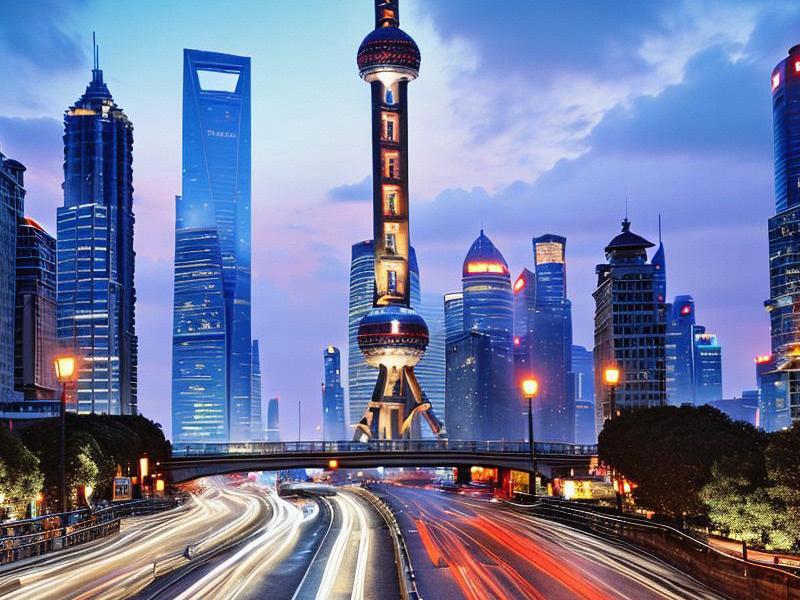This article delves into the multifaceted aspects of Shanghai, exploring its transformation from a modest fishing village to a global metropolis. It highlights the city's rapid urban development, its status as an economic powerhouse, the rich cultural tapestry that defines it, and its increasing global influence.

Shanghai, often referred to as the "Pearl of the Orient," stands as a beacon of modernity and progress on the banks of the Huangpu River. This vibrant city has undergone a remarkable transformation over the past century, evolving from a small fishing village into one of the world's most dynamic and influential metropolises.
The story of Shanghai's urban development is nothing short of extraordinary. In the early 20th century, the city was already a major port and commercial hub, attracting traders and entrepreneurs from around the globe. However, it was after World War II and the subsequent establishment of the People's Republic of China that Shanghai truly began to flourish. The city's strategic location along the Yangtze River Delta and its proximity to the East China Sea have made it a crucial node in global trade and commerce.
Over the decades, Shanghai has invested heavily in infrastructure, transforming its skyline with iconic skyscrapers such as the Oriental Pearl Tower, the Jin Mao Tower, and the Shanghai Tower. These architectural marvels are not only symbols of the city's economic prowess but also serve as testaments to its commitment to innovation and modernity. The Bund, a historic waterfront area, has been revitalized to offer a blend of historical charm and contemporary luxury, attracting millions of visitors each year.
Shanghai's economic power is unparalleled in China and extends globally. It is the financial heart of the country, housing the Shanghai Stock Exchange, one of the largest stock exchanges in the world. The city is also home to numerous multinational corporations, financial institutions, and tech startups, making it a hub for business and innovation. The Pudong New Area, developed in the late 20th century, has become a symbol of Shanghai's economic transformation, with its skyline dominated by futuristic skyscrapers and its streets bustling with activity.
上海龙凤419社区 The city's economy is diverse, encompassing finance, trade, manufacturing, and services. Shanghai's free trade zone, established in 2013, has further solidified its position as a gateway for international trade and investment. The city's strategic initiatives, such as the Belt and Road Initiative, have also positioned it as a key player in global economic development.
Culturally, Shanghai is a melting pot of traditions and modernity. The city is known for its unique blend of Chinese and Western influences, reflected in its architecture, cuisine, and arts. The French Concession, a historic area with cobblestone streets and colonial-era buildings, offers a glimpse into the city's colonial past. Meanwhile, areas like Nanjing Road and Huaihai Road showcase the vibrant shopping and dining scenes that define Shanghai's modern lifestyle.
Shanghai's culinary scene is renowned for its variety and quality. From traditional Shanghainese dishes such as xiaolongbao (soup dumplings) and shengjianbao (pan-fried buns) to international cuisines, the city offers something for every palate. The night markets and food streets are particularly popular, providing an authentic taste of the city's culinary diversity.
The arts and culture scene in Shanghai is equally vibrant. The city is home to numerous museums, galleries, theaters, and music venues, showcasing a wide range of artistic expressions. The Shanghai Museum, with its extensive collection of Chinese art, is a must-visit for art enthusiasts. The city also hosts numerous cultural festivals and events throughout the year, attracting visitors from around the world.
上海龙凤419体验
Shanghai's educational institutions are among the best in China, attracting students and researchers from across the globe. Fudan University and Tongji University are two of the most prestigious institutions, offering a wide range of programs in various fields. The city's commitment to education and research has contributed to its reputation as a center of learning and innovation.
In recent years, Shanghai has made significant strides in environmental sustainability. The city has implemented various initiatives to reduce pollution, promote green energy, and improve public transportation. The Maglev train, the world's fastest commercial train, connects Shanghai to nearby cities, offering a fast and eco-friendly mode of travel. The city's parks and green spaces provide residents and visitors with opportunities to enjoy nature amidst the urban sprawl.
Shanghai's global influence extends beyond its economic and cultural achievements. The city has played a pivotal role in international diplomacy and cooperation. As a member of the United Nations and a host city for numerous international summits and events, Shanghai has become a platform for dialogue and collaboration among nations.
爱上海同城对对碰交友论坛 The city's leadership in technology and innovation has also positioned it as a global leader in the digital economy. Shanghai is at the forefront of China's tech boom, with companies like Alibaba, Tencent, and ByteDance having a significant presence in the city. The city's tech ecosystem is characterized by a dynamic startup culture, venture capital investment, and a supportive regulatory environment.
Shanghai's future looks promising, with continued investments in infrastructure, technology, and sustainable development. The city aims to further enhance its global connectivity, strengthen its position as a financial hub, and promote cultural exchange and understanding. The ongoing construction of the Hongqiao Comprehensive Transportation Hub, which will integrate air, rail, metro, and bus services, is expected to further enhance the city's connectivity and efficiency.
In conclusion, Shanghai is a city that embodies the spirit of modernity, innovation, and cultural diversity. Its rapid urban development, economic power, rich cultural heritage, and increasing global influence make it a unique and dynamic metropolis. As Shanghai continues to evolve, it remains a symbol of China's rise as a global superpower and a testament to the potential of urbanization and modernization.
The story of Shanghai is not just a story of a city's transformation but also a reflection of China's journey towards modernity and global prominence. The city's achievements serve as an inspiration for other cities around the world, demonstrating the possibilities of sustainable development, economic growth, and cultural exchange.